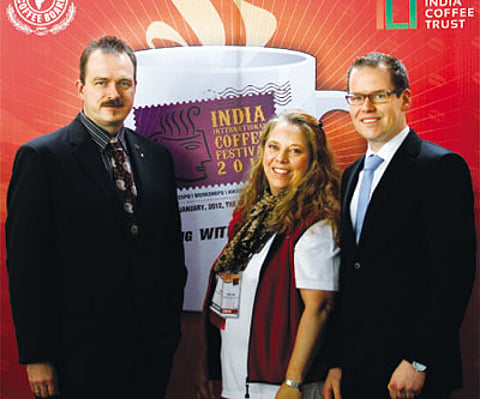

Tea may well be the the reigning national drink, but coffee consumption is going in only direction in India: north.
The growing strength of the coffee industry in India was on display at the three-day India International Coffee Festival held recently in the capital from January 18 to 20.“The café culture has come up very strongly in India in recent times. Youths love to hang out at the numerous coffee joints scattered all around the country. Indians are finally becoming conscious about their cup of coffee. Most noteworthy is north India, which has recorded a 30 to 35 per cent increase in coffee consumption. South India, a major coffee drinking region recorded just two per cent growth,” says Anil Bhandari, chairman, India Coffee Trust and India International Coffee Festival 2012.
The staggering growth of coffee drinkers in north India shows a shift in the nation’s coffee culture. The biggest testimony to this fact was that the festival was organised in New Delhi for the first time. The festival brought together coffee growers, roasters, exporters, traders, equipment manufacturers among others under one roof. Along with that, it showcased the best coffee varieties, services and cutting-edge coffee making technologies.
Of the total coffee consumption, 57 per cent is of instant coffee while 43 per cent is roast and ground (filter). Stefan Graack, senior sales manager for Neuhaus-Neotec in Ganderkesee, Germany and an expert in the field of roasting systems for 18 years, says, “It is a drink with a metrosexual appeal, yet retro in its origin. Roasting is one of the most important and challenging processes in making coffee. It makes a subtle difference and enhances the experience.” He further adds that air-roasted coffee is full of complex and delicious flavours. Most Indians are not aware of this flavour.
Marit Lynes, who is a promoter of the ‘good coffee culture’ and is an information manager at the Norwegian Coffee Association, feels that brewing coffee is no rocket science. “Making a cup of good coffee is as simple as making a one. The trick lies in ensuring that the contact time between the coffee and water is perfect. Right temperatures should be maintained and grinding of the beans should take place in a clean pot,” she says. Lynes further adds that coffee is the most non-challenging ingredient to work with.
Whether it is a complex process or an easy one, almost all the experts, including Robert Heisterkamp, the area sales manager for Probat in India, feel that the best kind of coffee is the locally grown variety. “There is always a possibility of mixing other brands to increase the output or to get a steady harvest, but in totality whatever grows locally is by far the best,” he says. Heisterkamp further adds that some speciality coffees, irrespective of having a big name in the market, can never match the fan-following of a locally grown coffee.
Sharing the most recent statistics, Bhandari says that between 2003 and 2009, there has been a fall in the number of non-drinkers; simultaneously the proportion of occasional drinkers has also increased. Thus the potential for growth lies with occasional drinkers and more so in north, east and west India. Heisterkamp adds that during the last few years, coffee consumption went up nearly in every market. With a production of about 5 million bags of the brown bean, India is growing into one of the biggest coffee producing nations. “This event is an ideal platform to identify and discover unparalleled talents in the coffee industry. All the experts have something new to offer and have researched for years before presenting papers on the subject,” says Heisterkamp.